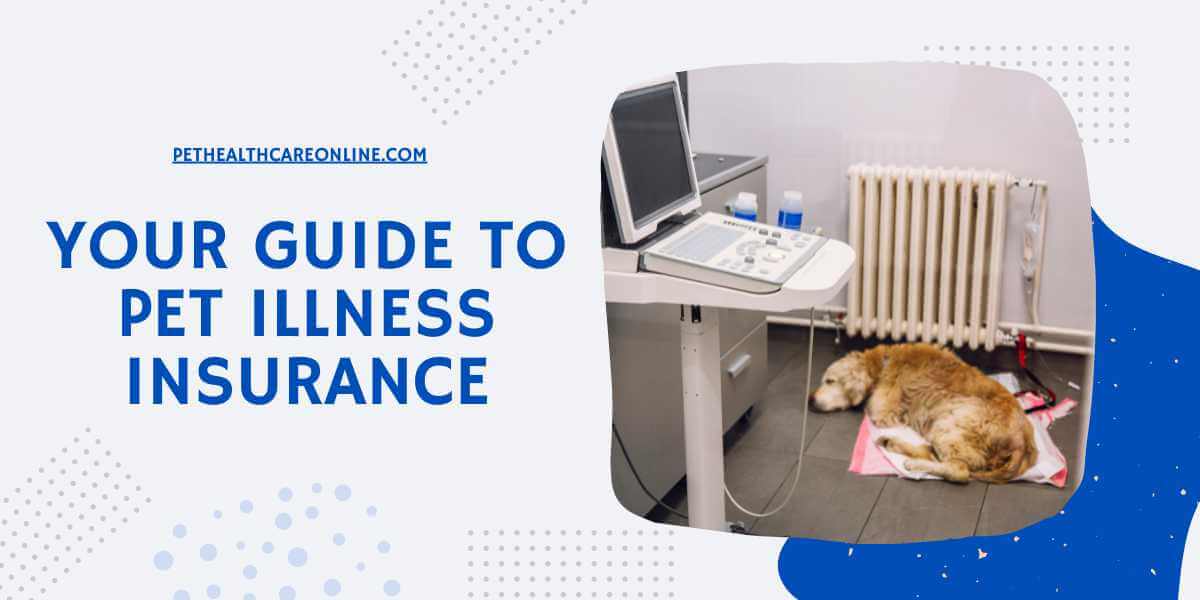Pet illness insurance, also known as pet health insurance, is a type of insurance that helps pet owners cover the costs of unexpected veterinary expenses for their furry companions. It can provide peace of mind and financial protection in the event of your pet’s illness or injury.
If you’re a pet owner or are planning to become one in the near future, you have to know that your pet’s bound to fall ill sooner or later. This is, in a way, common sense, since we humans, too, fall ill all the time. That’s one of the main reasons why we have health insurance.
Regardless of whether you’ll be a puppy or a kitty parent, one of the smartest decisions you could make is to get pet health insurance for them. Vet services can be surprisingly costly yet regardless, your pet will surely come to depend on them.
But, is there a pet insurance illness cover? Some dog breeds have a genetic predisposition for a variety of conditions. But even those that don’t still have a high probability of developing cancer, heart problems, liver problems…you get the gist.
Getting pet insurance is one of the safest ways to ensure that whatever costs you may spend on treatment and therapy (or at least most of them), will be covered.
But what are these conditions exactly? How does the whole process go, and which pet insurance providers on the market are the best ones to turn to?
Pet Illness Insurance Cover
Before proceeding, we have to note one thing; there is no such thing as a specific, illness only pet insurance policy. Pet illnesses are usually incorporated in most other pet insurance policies, such as lifetime insurance policy, time-limited insurance policy, or maximum benefit insurance policy.
Most common illnesses covered by pet insurance include digestive problems, heart issues, different types of cancer, skin and/or coat/fur problems, hereditary conditions – elbow and hip dysplasia -, diabetes, thyroid disease, upper respiratory infections, vomiting, diarrhea, cough, nervous system issues, cataracts, liver disease, change in weight, and others.
Any conditions which have resulted from accidents, such as broken bones, cuts and lacerations, and similar, are also included in these insurance plans. There are, however, some problematic points. The first one to know – most insurance policies come with a waiting period.
Immediate Insurance for Pre Existing Illnesses & More
To put it simply, pet insurance companies don’t like to be “tricked” into covering the expenses for a pet that is likely to get ill soon. A pet may look healthy, but the owner might be aware of a pre-existing condition, or an accident that will probably result in the pet needing immediate medical attention.
Such owners may intentionally get pet insurance shortly before the treatment in order to avoid paying for it. This is why most pet insurance companies come with a waiting period of around 14 days, during which you can’t rely on the insurance to cover medical costs.
Truth be told, many pet insurance companies have removed this waiting period in order to attract more customers. If you’re really insistent on getting immediate insurance cover for your pet (hopefully not because you want to scam the insurers), you can do your research and you’ll probably find a suitable company that offers it.
Accident and Illness Pet Insurance
Once that’s settled, it’s great to know that, aside from accident only insurance, all other types of pet insurance cover both accidents and illnesses. This is, in a way, great news, since even illnesses developed as a result of accidents tend to fall under this category.
It’s true that these types of insurance plans are more expensive than the accident-exclusive ones, but they obviously cover a wider range of conditions. It’s always best to play it safe.
Pet Insurance for Pre-Existing Condition
Be aware of any pre-existing pet conditions at the time of your getting the insurance.
If there’s one thing pet insurance companies can be tricky about, then it’s definitely this.
Let’s be clear – all pet insurance companies recommend that you insure your pet as soon as possible, preferably when they’re still a kitten or a pup. This way, whichever conditions they may develop – illness, or accident-related – will be covered by the insurance policy. Moreover, as long as you stay with the same provider, this coverage will extend indefinitely.
However, if you only decide to insure your pet once it’s in its twilight years, or you decide to change insurers for any reason (mostly due to price increases, as aging pets’ owners will be charged more), any such illnesses will be considered pre-existing conditions.
In other words, they won’t be treated. Regardless of how they came to be, they will be considered as part and parcel of the pet itself, hence not covered by the new insurance.
Again, as with the waiting period, you’re sure to find that some insurance companies are more relaxed, so they may even treat some (but not all) pre-existing conditions, depending on their policy. Still, it’s best not to risk it and get your pet insured, ASAP.
Best Pet Illness Insurance
So, which ones do we think are the best pet insurance providers to aim for?
No need to drag things out, here’s a whole list:
- Trupanion
- Embrace Pet Insurance
- Spot
- Pets Best
- ASPCA Pet Health Insurance
- Pet Assure
- FIGO
- Fetch by the Dodo
- Healthy Paws
- Nationwide
- PetFirst
- Lemonade
Although we can vouch that you’ll choose great as long as you go for whichever one of these, our own personal favorites have to be the top 5 options.
Considering Your Pet Insurance Providers: The Verdict
ASPCA, for example, stands out for three things – their exclusive coverage of horses, their special coverage of behavioral problems (obsessive licking, chewing, or fur pulling), and their cover of pre-existing conditions which have re-emerged after 180 days of no symptoms.
Pets Best comes with no age restrictions and with a significantly shortened waiting period. Their policies also incorporate a wellness plan, which includes neutering, vaccinations, chipping, and similar procedures which aren’t always covered by regular pet health insurance.
Spot earns its spot by giving a wide variety of annual coverage options, designed to fit with every budget, ranging between $2,500, $7,000, $10,000, and even unlimited coverage. They also have a startlingly low $100 deductible available, in addition to offering a 10% discount for multiple pets.
Embrace, one of the best out there, also comes with an incredibly wide range of options, in addition to sporting a “diminishing deductible”, which makes your deductible decrease throughout the year as long as you don’t file a claim (basically, as long as your pet’s healthy).
Finally, Trupanion comes with some extra features, not seen in any of the other options, such as a lifetime per-condition deductible instead of annual deductibles alternative, and a refer-a-friend program, whereby you earn $25 (with a limit of $100 per year) for every friend that you recommend Trupanion to.
Also, they have a direct payment option for vet expenses, as well as offering rewards for lost pets, covering the fees for any damage that your pet might have caused, or covering the boarding fees for your pet if you get hospitalized.
All in all, even though we believe that Trupanion, as well as Embrace, are arguably the best options out there, you won’t make a mistake by going for any of the other options either.



